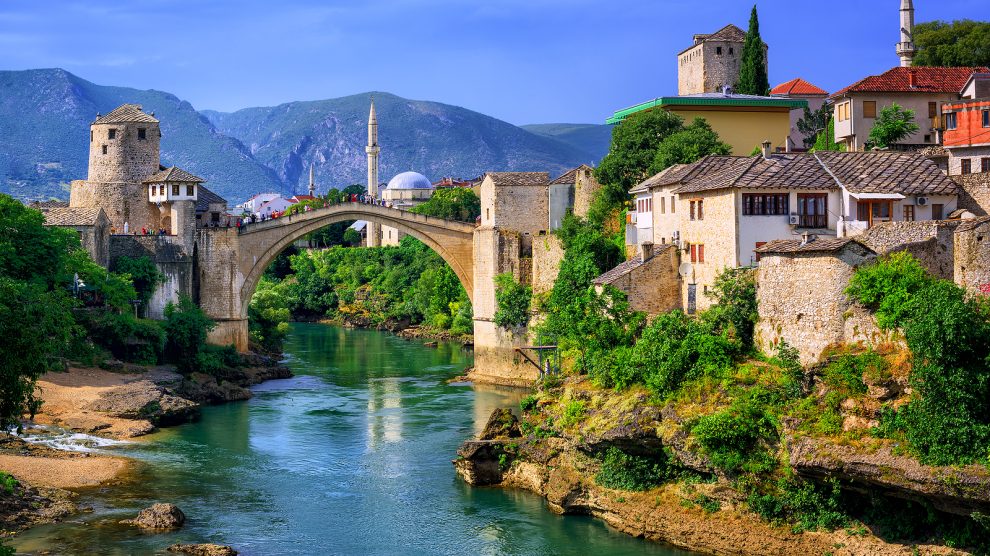The Dayton Peace Agreement halted the war in Bosnia and Herzegovina 29 years ago, but left behind a deeply flawed and divided political system. A new war in the country is not certain, but the danger is growing.
The 1995 Dayton Peace Agreement ended Bosnia and Herzegovina’s war, but the document is not perfect. Nevertheless, it is currently the only thing keeping the peace in what remains a divided country. If the Dayton Peace Agreement were to be dismantled, it would mean the collapse of peace.
Over the past few years, the public in Bosnia and Herzegovina, the Bosnian diaspora, and many people in the region have been concerned about the state and future of Bosnia and Herzegovina. While separatist narratives perpetuated by the authorities of Republika Srpska are nothing new, in the past month, there has been intense discussion about a potential new armed conflict. The trigger was the Resolution on Srebrenica, which was adopted by the United Nations on May 23.
- More reform key to further progress in Bosnia and Herzegovina
- Bridging economies: The catalyst role of low-cost cross-border payments in the Western Balkans
- The success of the EU’s 2004 enlargement must drive a new wave of expansion
Although the adoption of the Srebrenica Resolution has no direct connection to the Dayton Peace Agreement, Serbian authorities believe the resolution puts Serbs in Bosnia in an unfavourable position. Some even argue it nullifies the Dayton Peace Agreement and effectively abolish Bosnia and Herzegovina’s two entities, the Republika Srpska and the Federation of Bosnia and Herzegovina.
The resolution declares July 11 as the International Day of Remembrance of the Srebrenica Genocide and calls for the inclusion of judicially established facts about the genocide in educational programmes. The announcement of this resolution has brought a series of positive reactions but some negative ones, too. Serbia and Serb authorities in Bosnia and Herzegovina launched a strong advocacy campaign against the adoption of the resolution. This campaign went so far as to include denial of genocide and glorification of war criminals.
Constant tension
This situation has led to new separatist ideas. The President of the Republika Srpska, Milorad Dodik, believes that the resolution makes the coexistence of Bosniaks and Serbs in Bosnia and Herzegovina impossible. He says Republika Srpska will, “adjust to the new circumstances because…there is no way to build a common life with Bosniaks”.
The potential secession of Republika Srpska could lead to a new armed conflict. Although the raw likelihood of such a conflict is small thanks to a chronic lack of resources, these threats of secession lead to constant tensions. This is also an easy way for a corrupt political elite to gain political points. The narrative of ‘preserving national identity’ and ‘protection’ which politicians ‘offer’ evokes strong emotions in people, making them more susceptible to manipulation, which allows politicians to maintain their positions.
Although there have been separatist movements in the past which did not lead to armed conflict, the situation in Bosnia and Herzegovina is particularly sensitive due to its very difficult historical context. The scars from the previous war are still fresh, and all three ethnic and religious groups see any change as an attack and an attempt at oppression.
An independent Republika Srpska is unrealistic
Essentially, the idea of an independent Republika Srpska is currently unrealistic and naive. It risks bringing great harm to its citizens. The existence of Republika Srpska within Serbia, which some desire, would lead to significant problems too, as Serbia struggles to take care of the territory it already has.
An independent Republika Srpska would also face many political and economic problems. It would not be recognised by European and global states, leaving it outside the EU and global currents. Republika Srpska already relies on foreign investment and in the event of secession, it would likely lose that support. Citizens would face massive inflation and shortages of basic goods.
Additionally, citizens of Republika Srpska would likely face what Kosovo had to deal with until the beginning of this year: the denial of visa-free travel to European Union countries. Kosovo declared its independence in 2008, but the possibility of traveling to Schengen Area countries without a visa was only granted in January 2024. The citizens of an independent Republika Srpska would likely find themselves in the same situation.
Time for young Bosnians to stand up
Although the potential for war is currently a major topic in Bosnia and Herzegovina, I believe the good citizens of Bosnia and Herzegovina will not allow this narrative to return them to the 1990s. Bosnia and Herzegovina boasts the richness of three peoples and three religions, along with plenty of prowess and reason for national pride in sports and the arts.
Instead of caving in to politicians who use pessimistic, backward-looking narratives to score political points and promote naive separatism, forward-looking Bosnians like me must turn to young activists who are working together to promote peace.
Unfortunately, any scenario is still possible. The risk of war exists, and the fear which comes along with that can shape politics. Citizens of Republika Srpska and Bosnia and Herzegovina as a whole must not allow themselves to be manipulated by politicians.
Coexistence in Bosnia and Herzegovina is entirely possible. If we work together, we can build a peaceful and united Bosnia and Herzegovina for future generations to enjoy.
Unlike many news and information platforms, Emerging Europe is free to read, and always will be. There is no paywall here. We are independent, not affiliated with nor representing any political party or business organisation. We want the very best for emerging Europe, nothing more, nothing less. Your support will help us continue to spread the word about this amazing region.
You can contribute here. Thank you.







Add Comment